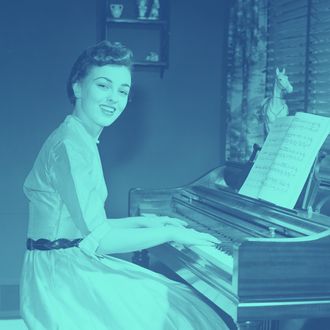
Perhaps you were once a kid who was made to take piano lessons. You tried — really, you did — but the teacher’s instructions were too much to hold in your overwhelmed little head. And so, as soon as your parents let you, you quit.
By you I mostly mean me, but anyone who had a similar experience with piano lessons will no doubt be intrigued by new research from a team of computer scientists who claim they have designed a device that teaches you how to play based on how efficiently your brain is processing the information. It is, in a sense, a teacher that can read your mind.
The device is called BACh, which stands for Brain Automated Chorales (and, obviously, is named for Johann Sebastian). It’s a little hat, sort of, with sensors that sit on your head and monitor the blood flow in your brain’s prefrontal cortex. This is thought to be a way of measuring cognitive load, or the amount of information people are currently holding in their working memory. “When you think, your heart pumps more blood and more oxygen to that part of the brain,” Beste Yuksel, a Ph.D. candidate at Tufts University and the creator of BACh, told Fast Company. On the other hand, when beginner piano players have gotten the hang of a piece of music, the blood flow to this brain region slows — and that’s when BACh allows them to move on to a new line of music.
Compare that to the traditional way of learning piano, which Fast Company reviews in case it’s been a while:
The traditional method for learning the piano is one hand at a time. Once a student can get through a line on the right hand, they move on to the left hand. But there’s no way to tell how hard their brain has to work to get through that line. Some people might breeze through it quickly, and their cognitive load is low, which means they’re truly ready to move on. Others may have to work really hard, so their cognitive load is heavy, and they’re at risk for mental exhaustion.
In a recent study Yuksel led testing BACh, she and her colleagues gave a small group of beginner piano players 15 minutes to learn a piece of music. Some of them learned with BACh, and others learned the regular way. At the end of the session, both groups played the newly learned music all the way through as best they could, and those who had practiced using BACh played with more speed and accuracy than those who had practiced in the traditional manner.
Yuksel sees BACh as a model for learning all sorts of difficult things, like foreign languages. “You could design the system however you want,” she told Fast Company. “As long as it’s a task that can be broken down into different levels of difficulty, you can increase the difficulty as cognitive load falls below a certain threshold.” As predictions for the future go, this brain-reading-piano-teacher thing is at least as cool as it is creepy.




